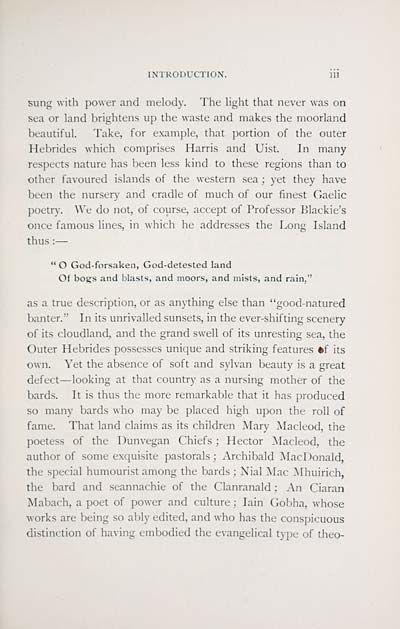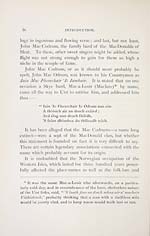Hew Morrison Collection > Poems and songs of John MacCodrum, Archibald MacDonald, and some of the minor Uist bards
(21)
Download files
Complete book:
Individual page:
Thumbnail gallery: Grid view | List view

INTRODUCTION. Ill
sung with power and melody. The light that never was on
sea or land brightens up the waste and makes the moorland
iKautiful. Take, for example, that portion of the outer
Hebrides which comprises Harris and Uist. In many
respects nature has been less kind to these regions than to
other favoured islands of the western sea; yet they have
ixen the nursery and cradle of much of our finest Gaelic
{)oetry. We do not, of course, accept of Professor Blackie's
once famous lines, in which he addresses the Long Island
thus : —
" O God-forsaken, God-detested land
Of bogs and blasts, and moors, and mists, and rain,"
as a true description, or as anything else than "good-natured
banter." In its unrivalled sunsets, in the ever-shifting scenery
of its cloudland, and the grand swell of its unresting sea, the
Outer Hebrides possesses unique and striking features èf its
own. Yet the absence of soft and sylvan beauty is a great
defect — looking at that country as a nursing mother of the
bards. It is thus the more remarkable that it has produced
so many bards who may be placed high upon the roll of
fame. That land claims as its children Mary Macleod, the
poetess of the Dunvegan Chiefs ; Hector Macleod, the
author of some exquisite pastorals ; Archibald MacDonald,
the special humourist among the bards ; Nial Mac Mhuirich,
the bard and seannachie of the Clanranald ; An Ciaran
Mabach, a poet of power and culture ; Iain Gobha, whose
works are being so ably edited, and who has the conspicuous
distinction of ha\ing embodied the evangelical type of theo-
sung with power and melody. The light that never was on
sea or land brightens up the waste and makes the moorland
iKautiful. Take, for example, that portion of the outer
Hebrides which comprises Harris and Uist. In many
respects nature has been less kind to these regions than to
other favoured islands of the western sea; yet they have
ixen the nursery and cradle of much of our finest Gaelic
{)oetry. We do not, of course, accept of Professor Blackie's
once famous lines, in which he addresses the Long Island
thus : —
" O God-forsaken, God-detested land
Of bogs and blasts, and moors, and mists, and rain,"
as a true description, or as anything else than "good-natured
banter." In its unrivalled sunsets, in the ever-shifting scenery
of its cloudland, and the grand swell of its unresting sea, the
Outer Hebrides possesses unique and striking features èf its
own. Yet the absence of soft and sylvan beauty is a great
defect — looking at that country as a nursing mother of the
bards. It is thus the more remarkable that it has produced
so many bards who may be placed high upon the roll of
fame. That land claims as its children Mary Macleod, the
poetess of the Dunvegan Chiefs ; Hector Macleod, the
author of some exquisite pastorals ; Archibald MacDonald,
the special humourist among the bards ; Nial Mac Mhuirich,
the bard and seannachie of the Clanranald ; An Ciaran
Mabach, a poet of power and culture ; Iain Gobha, whose
works are being so ably edited, and who has the conspicuous
distinction of ha\ing embodied the evangelical type of theo-
Set display mode to: Large image | Transcription
Images and transcriptions on this page, including medium image downloads, may be used under the Creative Commons Attribution 4.0 International Licence unless otherwise stated. ![]()
| Early Gaelic Book Collections > Hew Morrison Collection > Poems and songs of John MacCodrum, Archibald MacDonald, and some of the minor Uist bards > (21) |
|---|
| Permanent URL | https://digital.nls.uk/81340015 |
|---|
| Description | A selection of items from a collection of 320 volumes and 30 pamphlets of literary and religious works in Scottish Gaelic. From the personal library of Hew Morrison, the first City Librarian of Edinburgh. |
|---|
| Description | Selected items from five 'Special and Named Printed Collections'. Includes books in Gaelic and other Celtic languages, works about the Gaels, their languages, literature, culture and history. |
|---|

